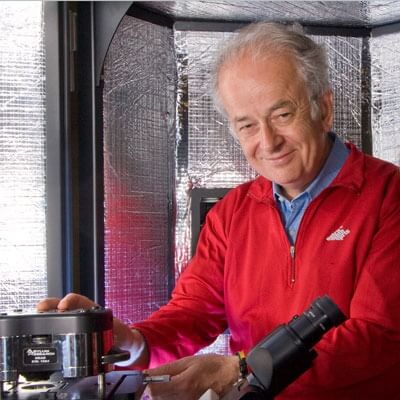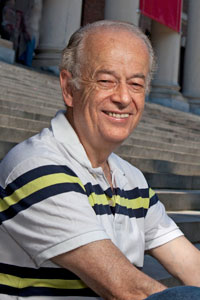News
Federico Capasso will be awarded the SPIE Gold Medal. (Photo by Eliza Grinnell, SEAS Communications.)
Cambridge, Mass. – April 23, 2013 – Federico Capasso, Robert L. Wallace Professor of Applied Physics and Vinton Hayes Senior Research Fellow in Electrical Engineering at the Harvard School of Engineering and Applied Sciences (SEAS), has been selected to receive the 2013 SPIE Gold Medal.
The Gold Medal, awarded to a single recipient annually, is the highest honor bestowed by SPIE, the international society for optics and photonics.
The SPIE Gold Medal has been awarded since 1977 to recognize outstanding engineering or scientific accomplishments in optics, electro-optics, or photographic technologies or applications. Recipients are recognized for their research having made “an exceptional contribution to the advancement of relevant technology.”
In a letter announcing the award, SPIE President Bill Arnold noted Capasso’s “seminal and wide-ranging contributions to photonics, in particular bandgap engineering of optoelectronic materials and devices, quantum cascade lasers and plasmonics-based photonic devices.”
Some of Capasso’s scientific highlights include the co-invention and demonstration of quantum cascade lasers (QCLs), and the development of high-power and chemical sensing applications using QCLs; bandstructure engineering and its applications to optoelectronics and electronics, including low-noise multilayer avalanche photodiodes and solid-state photomultipliers; heterojunction bipolar transistors and quantum effect devices, such as resonant tunneling transistors and QCLs, which represent the ultimate bandengineering; and new semiconductor lasers with engineered near-field and far-field based on plasmonics. His work has produced highly collimated QCLs, multi-beam and multiwavelength QCLs; lasers with polarization control; and plasmonic laser antennas. He has also designed experiments and MEMS devices for the measurement of Casimir forces, resulting in the first measurement of a repulsive Casimir force and studies of Casimir-based nanomechanics.
“For more than 30 years Capasso has been one of major forces in the field of photonics. As the recognized father of bandgap engineering he has dominated the field of bandgap engineering, optoelectronics heterostructure materials and devices that culminated with the demonstration of low-noise avalanche, photomultiplier detectors and finally with the demonstration of the quantum cascade laser, of fundamental importance for science and society,” said Gérard Mourou of the École Polytechnique in France. “He is one of the few scientists that can handle with equal virtuosity fundamental and applied researches.”
Capasso has authored over 450 peer-reviewed journals, conference proceedings, invited papers, and books. His research group presented no fewer than 20 papers at the SPIE’s Photonic West conference in San Francisco in February, including three invited papers and a keynote speech.
Capasso will be honored at the SPIE Awards Banquet on August 28, 2013, scheduled in conjunction with SPIE’s Optics & Photonics Symposium to be held the week of 25–29 August, 2013 in San Diego, California. The award comes with an honorarium of $10,000.
###
About SPIE
SPIE is the international society for optics and photonics, a not-for-profit organization founded in 1955 to advance light-based technologies. The Society serves nearly 225,000 constituents from approximately 150 countries, offering conferences, continuing education, books, journals, and a digital library in support of interdisciplinary information exchange, professional networking, and patent precedent. SPIE provided over $3.2 million in support of education and outreach programs in 2012.
Adapted from materials provided by SPIE.
Topics: Awards, Applied Physics
Cutting-edge science delivered direct to your inbox.
Join the Harvard SEAS mailing list.
Scientist Profiles
Federico Capasso
Robert L. Wallace Professor of Applied Physics and Vinton Hayes Senior Research Fellow in Electrical Engineering



